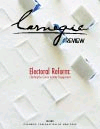Mar. 23 - Florida relies increasingly on court "user fees" to subsidize its criminal justice system. This practice -- known as cash register justice -- creates a vicious cycle of debt for ex-offenders and threatens their successful re-entry into society. Since 1996, Florida has added more than 20 new categories of financial obligations to those accused and convicted of a crime; the fees are levied on those who are indigent, cannot pay, and sometimes can find themselves incarcerated if they miss a payment. "Is heaping debt on those unable to afford it a sensible or moral approach to financing state functions?" asks Rebekah Diller, author of the Brennan Center’s new report, The Hidden Costs of Florida's Criminal Justice Fees. Read about our work on court fees and fines.
Senate Passes Bill to End Cocaine Sentencing Disparities
Mar. 17 - Currently, low-level offenders of crack cocaine laws receive sentences that are 100 times greater than those sentenced under powder cocaine laws. Today, the Senate passed the Fair Sentencing Act, which would reduce this inequality to
18 to 1. The racial impact of the disparate sentencing laws is plain: 82% of those sentenced under federal crack cocaine laws are black -- though 62% of crack cocaine users are white. NPR has more about the bill and its intended effects.
Read Nicole Austin-Hillery's statement on the bill's passage.
Restore the Right To Vote
Mar. 16 – The Brennan Center for Justice urged House leaders to pass the Democracy Restoration Act. The bill would restore the right to vote to nearly 4 million American citizens with a past criminal conviction, now living and working in their communities. “Congress is listening to 4 million silenced Americans,” said Erika Wood, Brennan Center attorney and author of Restoring the Right to Vote: “Excluding millions of citizens from the franchise only weakens our democracy. Congress should pass the Democracy Restoration Act because a strong, vibrant democracy requires the broadest possible base of voter participation, across all sectors of society." Read testimony by Brennan Center Legal Director Burt Neuborne. See the NY Times editorial on the bill, and other recent press.
The House considers “Corporate Governance after Citizens United”
Mar. 11 - The House Financial Services Committee today looks at possible reforms designed to protect corporate shareholders from corporate election expenditures. The Brennan Center submitted testimony that recommends a modification in securities law to give shareholders the power to authorize political expenditures; the Center also recommends that Congress require corporations to disclose past political spending to shareholders. Read Ciara Torres-Spelliscy’s submitted testimony. See our recent report on the topic, Corporate Campaign Spending: Giving Shareholders a Voice.
- Should Felons Lose the Right to Vote?
(Wall Street Journal, by Ashby Jones, 03/22/10) - Investigate the ‘bad things opinion’
(National Law Journal, by David Shapiro, 03/22/10) - Democrats counter Republicans’ pre-redistricting push
(Washington Post, by Chris Cillizza, 03/22/10) - Colorado Campaign Finance Law Unconstitutional: Supreme Court
(Huffington Post, 03/22/10) - Ex-Offenders and the Vote
(New York Times, Editorial, 03/21/10) - The Right to Counsel: Woman Becomes a Test Case
(The New York Times, by William Glaberson, 03/21/10) - From Scandal to Example in West Virginia
(New York Times, Editorial, 03/19/10) - How to Fairly Fund an Election: Advocates defend the constitutionality of CT’s public funding law
(In These Times, by Melinda Tuhus, 03/19/10) - Federal restrictions on foundations impede access to justice – a cause for concern
(NCRP Blog, by Niki Jagpal, 03/18/10) - Criminal Defense Attorneys Build War Chest, Gain Support in New York City
(New York Law Journal, by Daniel Wise, 03/18/10)
Investigate the ‘bad things opinion’
A real public debate about the decision to authorize torture requires an investigation that extends to White House and CIA officials.

West Virginia Moves on Corporate Campaign Finance Disclosure
West Virginia’s legislature passed a bill requiring public disclosure by corporations on their campaign spending. WV voters will hopefully soon know who is bankrolling political ads, post-Citizens United.

Restoring voting rights to millions
Today Congress is listening to 4 million silenced Americans. Leaders of the House Judiciary Committee are holding a hearing on the Democracy Restoration Act, legislation that seeks to restore the right to vote to people with a criminal records who are out of prison, living in the community. This bill would eliminate the last blanket barrier to the franchise, and reverse decade of discrimination create by laws firmly rooted in our country’s Jim Crow history.
Illustrations by Risko
with Garima Malhotra
introduction by Charles Ogletree
 Electoral Reform Report
Electoral Reform Report
The latest Carnegie Review report (pdf) charts more than a decade of nationwide voting reform efforts. “Based on the research and advocacy done in the past several years, there is now a chance to solve some of the major problems in the long run by enacting legislation that will modernize the way voter registration is done,” Brennan Center Executive Director Michael Waldman says in the report. The Carnegie Review highlights Brennan Center lawsuits and comprehensive studies which helped increase access to the vote. Learn more about our current work to modernize voter registration.
Correction: A Different Reading of Senate Rule VII § 3(e)

A revision to how the new Senate Rules are being applied in practice in the NY State Legislature.





